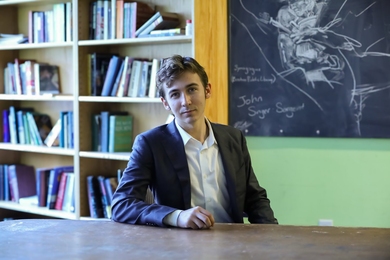What is citizenship and how is it affected by race and gender? How have concepts of identity evolved over time? And what role do race and gender play in contemporary border conflicts? These are among the central questions motivating the launch of The Borders Research Initiative in MIT Women's and Gender Studies (WGS), which will hold its kickoff event, "Border Crossing: Citizenship, Race, Gender," on Oct. 12–13 at MIT's Stata Center.
The initiative, which grew out of a regular series of intellectual forums held by WGS and the Center for Bilingual/Bicultural Studies, is a major new research, teaching and community engagement initiative hosted by WGS and open to everyone in the MIT community.
More than passports
"Citizenship is about more than passports," says Associate Professor of History Christopher Capozzola, an organizer of the initiative. "Citizenship is also about culture and lived experience. And — this is key to this conference — it's about participation, belonging. For the purposes of our project, 'borders' represent both the actual physical borders between nations states and the conceptual categories separating one people from another."
This month's interdisciplinary symposium will bring a broad spectrum of MIT faculty in the humanities, arts and social sciences together with lawyers, activists and artists to examine border crossing and citizenship as they relate to gender, sexuality, race, ethnicity, class and religion.
Citizenship, Race, and Gender
An MIT Symposium
Oct. 12-13, 2012
MIT Stata Center, 32-D461 | 9:30 a.m.
Free | Open to the public
More information | borders2012@mit.edu
Sponsored by the MIT Program in Women's and Gender Studies, Foreign Language and Literatures' French Studies, Center for Bilingual/Bicultural Studies, and the Committee on Race and Diversity.
How gender affects citizenship
"We want to insert gender into this discussion because people understand differences in citizenship and race but are not aware of how that has intersected with gender historically," says Emma Teng, the T.T. and Wei Fong Chao Professor of Asian Civilizations, Associate Professor of Chinese Studies, and co-organizer of the symposium.
For example, after the passage of the Marital Expatriation Act of 1907, American women were routinely stripped of citizenship if they married Chinese men (who were prohibited from naturalization by the Chinese Exclusion Act of 1882) — a fate that did not befall American men who married Chinese women, says Teng, who will discuss this policy and its ramifications during her talk Saturday: "Dependent Citizenship and Chinese Exclusion: Race, Gender, and Class on Two Ends of the U.S.-China Migration Corridor."
Asylum status and other contemporary issues
The symposium will also address contemporary border questions, such as the fate of lesbian, gay, bisexual and transgender (LGBT) individuals who have requested asylum status in the United States on the basis that their home nation outlaws same-sex relations. "What are the obligations of the United States in such cases, and what precedents are you setting?" asks Capozzola, noting that the risks of offering asylum include raising charges that the United States is meddling in the affairs of other countries.
Contemporary border issues will be explored by Rachel Rosenbloom, an associate professor at Northeastern University School of Law known for her advocacy work on wrongful deportations, in Saturday's keynote address: "Citizenship's Borderlands."
Friday's keynote, "Border Intimacies," will be presented by Nayan Shah, professor and chair of the Department of American Studies and Ethnicity at the University of Southern California. Shah is the noted author of Stranger Intimacy: Contesting Race, Sexuality and the Law in the North American West.
The symposium will also feature talks on research topics ranging from "Convertible Veils: Negotiating Muslim Identities in the West" to "Rethinking Family in Immigration Law: Beyond Marriage and Blood Ties." One cluster of papers will compare issues of citizenship and identity across various settings in the French-speaking or "Francophone" world, including adoption and border crossing in contemporary France.
Community-building within MIT
Focused on presentations by MIT faculty, the program provides a rare opportunity to learn more about the research of junior faculty members, many of them within the School of Humanities, Arts, and Social Sciences.
"This event is aimed at community-building," Teng says. "All of the faculty at MIT are really busy, so we need to create opportunities to get together and share ideas and develop synergy across the disciplines."
Featured junior faculty members include: Hiromu Nagahara (History), Lerna Ekmekcioglu (History), Manduhai Buyandelger (Anthropology), Bruno Perreau (Foreign Languages and Literatures), Sasha Costanza-Chock (Comparative Media Studies), Vivek Bald (Comparative Media Studies/Writing), and Azra Akšamija (Architecture). Perreau and Bald served on the symposium's organizing committee, along with Associate Professor Margery Resnick of Literature and Sally Haslanger, professor of philosophy and director of WGS.
The Dream Act and the path to citizenship
Capozzola, whose own talk Saturday will center on the proposed Dream Act and how it would influence the path to citizenship for undocumented men and women, says he hopes the symposium will build momentum for the Borders Research Initiative by inspiring faculty members to collaborate and to formulate new questions for investigation, enriching the academic life of the Institute. Ultimately, he says, "we're also hoping to make this a teaching initiative, encouraging more teaching around these questions at MIT."
Teaching is an important goal, Teng says, because immigration and border crossing are issues of significant interest to MIT students, a diverse group with increasing interest in working overseas. "They're really thinking about these issues," she says. "The younger generation is very aware that they live in a global world."








